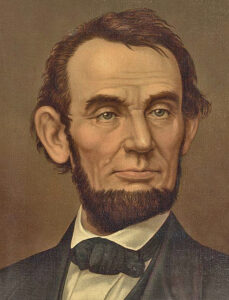Sacrifice Leaves Inspiration
President Abraham Lincoln famously began his Gettysburg Address with “Four score and seven years ago…” to convey that liberty and equality were at the crux of the nation’s founding and had survived 87 years since the stirring words of the 1776 Declaration of Independence. But, of course, those principles were vulnerable to destruction in November 1863 because of the ongoing Civil War. Lincoln mentioned the war in his short address, but did not use terms like
Union or Confederacy or highlight specific military heroes. Was Lincoln attempting to exclude division and focus his listeners on a larger vision for national unity? Was he trying to extend forgiveness to the South? Some Americans at that time, such as Frederick Douglass, believed that Confederate soldiers represented slavery and treason and should not be forgiven too easily. Yet at Gettysburg. Lincoln displayed no anger, only offering a deep sense of mourning at the “hallowed ground” and a determined call for duty regarding the nation’s “unfinished work.”
In his speech, Lincoln directly connected the significance of the preservation of the nation to the immeasurable sacrifice of Union soldiers, emphasizing the necessity of devoting part of the field to their memory. The cemetery held over 3,500 Union bodies. Speaking to more than ten thousand listeners, the president asserted that the nation had the power to honor these men by following through on the war which they had “so nobly advanced.”
Lincoln also did not mention slavery or emancipation. Douglass believe that the abolition of slavery was the central goal of the war. He was not among the audience at Gettysburg, but he surely would have been disappointed by the exclusion. Lincoln did speak about “a new birth of freedom,” which may have been a reference to Sam Wilkeson, a friend of Lincoln’s and a famous war correspondent, who had made a similar point when writing for the New York Times two days after Gettysburg. Wilkeson had discovered his oldest son Bayard, an artillery officer, dead. The journalist wrote that the blood of dead soldiers like his son had baptized “the second birth of freedom” (Pinsker, Lincoln’s Writings). Whether or not Lincoln had actually read Wilkeson’s piece first, both men revealed in their writings a hope that Union victory in the war would lead to the end of slavery in America. Even at Gettysburg, in his short dedication remarks, that seems to be the underlying purpose of Lincoln’s appeals to his war-torn nation.
By Nick Rickert, June 2021
Lincoln’s Gettysburg Address, read by Professor Wronski

